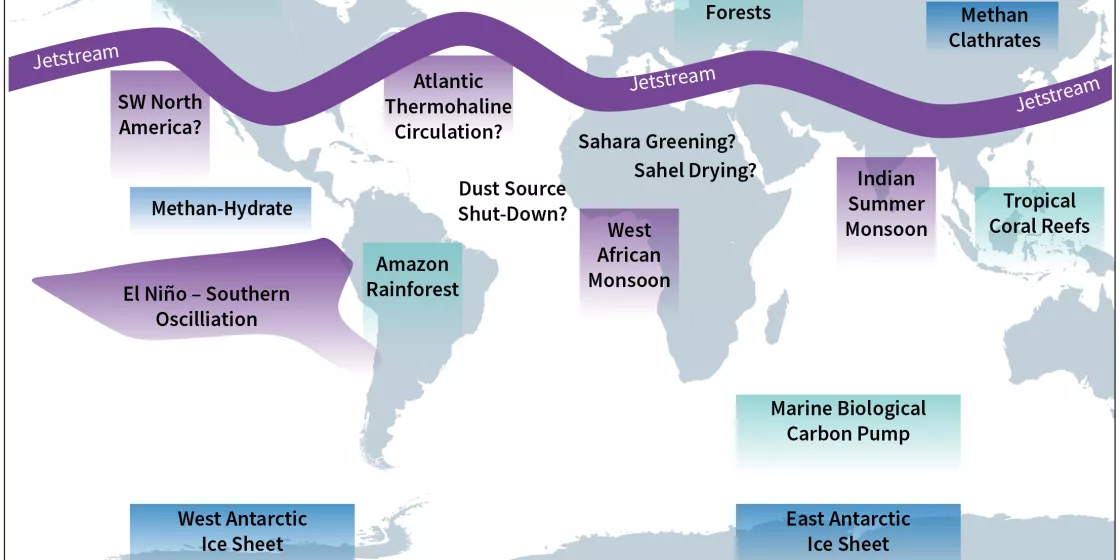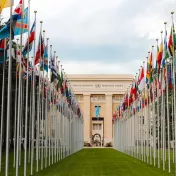Extreme weather events in 2022—such as the monsoon-related floods in Pakistan, Hurricane Ian in the U.S. and Cuba, or the severe drought in Europe—have once again brought to light the inescapable truth that climate change is happening now, and with catastrophic consequences. Experts estimate that 40% of the world's population is currently at high risk from the impact of climate change. However, ongoing climate change is already stressing ecosystems and burdening communities beyond their capacity to adapt, leading to increased losses and damages. This trend is also evident in the international climate negotiations, where the issue of Loss and Damage is becoming increasingly important, as was seen at COP27. As climate change accelerates droughts, floods, hurricanes, or sea level rise, and forces people to permanently leave their homes, lose their access to water and food, or even their lives, human security—a concept that encompasses the impact of specific threats on the safety of individuals and communities—will also be severely affected.
The IPCC expects this development to accelerate because important tipping points in the climate system could already be exceeded at a temperature rise of 1 to 2 degrees (current policies are expected to lead to 2.7 degrees warming). Tipping points are critical thresholds in the Earth's climate system that will cause severe and usually irreversible changes when they are crossed. They could even trigger a cascading effect that amplifies the effects of climate change many times over. One example for such a tipping point would be changes in the Atlantic Meridional Overturning Circulation, to which the more commonly known Gulf Stream belongs. When the tipping point is crossed and the circulation slows down, which is already happening today, it will greatly affect global precipitation and temperature patterns, leading to a loss of approximately 58% of the land suitable for wheat production. This would have drastic impacts on global food security and losses and damages and would pose a great threat to human security.
In recent years, research has increasingly focused on tipping points and their implications for natural sciences. However, apart from a study conducted by E3G that examines the impact of tipping points on geopolitics, their socioeconomic impacts and implications for human security and Loss and Damage have been largely overlooked. Therefore, this blog series aims to provide a general overview of the relationship between climate change, tipping points, human security, and the associated losses and damages. While this first blog post will introduce the topic on more general terms, the four following blog posts will focus on specific tipping points:
- the melting of the Greenland Ice Sheet and its effects on the Atlantic Meridional Overturning Circulation
- the transformation of the Amazon Rainforest
- the destruction of Coral Reefs
- the collapse of the West Antarctic Ice Sheet
In addition to an overview of their physical nature, they will also outline the implications for human security, including Loss and Damage.
What is a tipping point?
Tipping points are often, but not necessarily, sudden thresholds in the Earth's climate system. Crossing them leads to substantial and irreversible changes in regional and global climate systems, and results in dire consequences for human security and Loss and Damage. Regionally, this could bring about more extreme temperatures, droughts, and changed precipitation among others. Globally, it could lead to additional emissions, temperature feedback loops, or to a more rapid sea level rise. Once a tipping point is crossed, there is only limited scope for influencing its speed or consequences.
Key tipping points include the collapse of the West Antarctic and Greenland Ice Sheets, the dieback of the Amazon Forest and the destruction of Coral Reefs, among others.
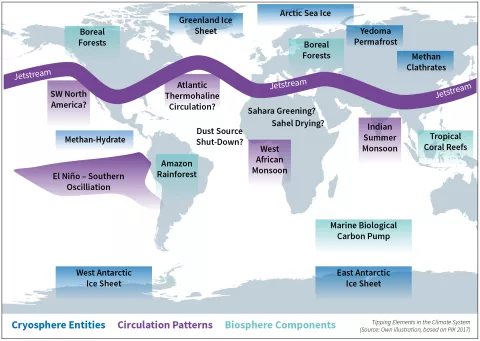
There remains uncertainty about when exactly the tipping points will be crossed. However, recent studies suggest that the Earth's system is on the verge of crossing a series of thresholds: exceeding the 1.5°C target could potentially trigger five tipping points, including the collapse of the Greenland and West Antarctic Ice Sheets, the death of Coral Reef, and the widespread abrupt thawing of permafrost. In this context, it is important to bear in mind that these events are not independent of each other, but rather interlinked. Crossing a tipping point could hence entail cascading effects that exacerbate climate change and result in long-term and irreversible changes in the foreseeable future. Therefore, policymakers need to be more ambitious in their mitigation actions and make limiting global temperature rise to 1.5°C their highest priority.
However, tipping points have often been underestimated in climate policy decision making, as they were believed to only have a low probability of being crossed. Nonetheless, insufficient mitigation efforts have made these events ever more likely. It is all the more concerning that a systematic approach to translating existing scientific evidence into concrete policy recommendations has yet to be developed. Managing climate risks will only become more urgent as tipping points are reached or even crossed. It is therefore vital that governments and international institutions are prepared to prevent or mitigate human security risks and further losses and damages. Let’s think about this.
What is human security?
Whereas the traditional understanding of security focuses on the security of the state, human security places individuals and communities at the centre of the debate. Rather than excluding the nation state or international security, however, it refines security to be more inclusive of the manifold threats in our world today which are rarely bound to state borders—that is, climate change, environmental and economic threats, water and food security, and health threats, among others.
Human security does not only focus on basic human needs, but also includes dignity, as former United Nations Secretary General Ban Ki-Moon described in the Human Security Report 2010, human security is the ‘freedom from fear, freedom from want and freedom to live in dignity’. Other definitions of human security even go one step further by adding the freedom of future generations to inherit a healthy environment or the freedom from the impact of hazard events.
How is human security linked to climate change and tipping points?
A human security perspective on climate change tries to assess how climate change negatively affects individuals and communities. Looking at the climate change induced increase of cyclones or sea level rise, its impact on human security seems obvious. The IPCC notes that ‘climate change is an important factor threatening human security through undermining livelihoods, compromising culture and identity, increasing migration that people would rather have avoided and challenging the ability of states to provide the conditions necessary for human security’. Since the literature on the effects of tipping points on human security and Loss and Damage is rather limited, we build our analysis on the premise that climate change is accelerated by the crossing of tipping points, thus amplifying its impact on human security.
To truly understand the connection between tipping points, climate change, human security, and Loss and Damage, we need to recall the various freedoms involved—freedom from fear, freedom from want, freedom to live in dignity, and freedom for future generations to inherit a healthy natural environment or freedom from the impact of natural hazards.
Freedom of future generations to inherit a healthy natural environment / Freedom from the impact of natural hazards
Freedom of future generations to inherit a healthy natural environment and freedom from the impact of hazard events have the most obvious connection to climate change and tipping points. As we all know, climate change threatens a healthy natural environment by increasing the frequency of extreme weather events such as hurricanes, droughts, or floods, as well as slow-onset events such as sea level rise, ocean acidification, or temperature increases. These events, in turn, affect not only human livelihoods and well-being, but also the functioning of ecosystems. When tipping points are passed, these negative consequences could be amplified in a relatively short period of time, leaving societies and natural systems unable to adapt in time—with serious consequences for human security. We are already seeing the dire consequences of more frequent extreme weather events such as floods (e.g., in Pakistan in 2022), droughts (e.g., in the central Sahel in 2022), and cyclones (e.g., Cyclone Winston in the Pacific in 2016) on human livelihoods. These impacts are set to worsen, as is the increase in number and speed of slow-onset events.
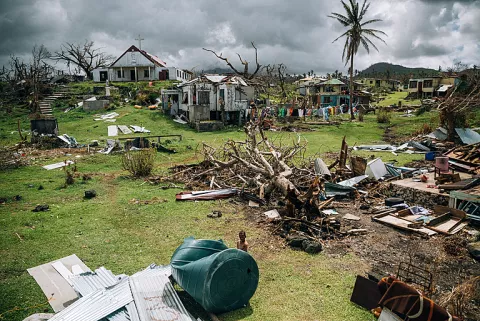
As the ground breaking ruling of the German Constitutional Court stated, this already affects fundamental rights of young people today as well as of the next generations, ‘the fundamental rights—as intertemporal guarantees of freedom—afford protection against the greenhouse gas reduction burdens imposed by Art. 20a of the Basic Law being unilaterally offloaded onto the future’. In other words, insufficient climate policies affect tomorrow's freedoms and fundamental rights. It is a constitutional requirement to reduce greenhouse gas emissions. Policymakers need to stop delaying them at the expense of younger generations.
Freedom from fear
The second component of human security is freedom from fear. This originally refers to the need to reduce weapons and interstate conflict and probably has the most indirect link to climate change and tipping points. However, in peace and conflict studies, climate change is usually categorised as a threat multiplier that can indirectly contribute to violent conflict by exacerbating potential pre-existing stressors such as water or food insecurity or loss of arable land, comprising human security. The complicated relationship between climate change and violent conflict can be illustrated through an example on food security: Rising temperatures and potential tipping point scenarios could lead to food export bans in the producing countries (as in 2010), which could contribute to food insecurity and instability in the recipient countries.
However, we would like to emphasise that there is no direct link between climate change and violent conflict. This assumption could be exploited for political purposes unrelated to climate change mitigation or adaptation, and could potentially encourage military responses. It could also lead to those most vulnerable to climate change being seen as threats to national security rather than in need of support. Therefore, we would like to emphasise that while climate change may indirectly lead to a higher risk of violent conflict, it is not a direct trigger of conflict and should not be viewed from a military perspective, but should encourage more cooperation and humanitarian assistance.
Freedom of want
The third component is the freedom of want, commonly referred to as the right to an adequate standard of living, which means that ‘everyone has the right to a standard of living adequate for the health and well-being of himself [sic: themselves] and of his [sic: their] family, including food, clothing, housing, medical care and necessary social services (…)’. This is connected to the human development agenda and includes social aspects threatened by climate change, such as food security, livelihood, health and development. Passing climate tipping points could put these aspects at significant risk by further straining the food security of millions of people or by jeopardising—and perhaps even destroying—economic growth. The IPCC even estimates that some sectors that are critical to the macro economy could become unviable once tipping points are crossed. This means that the right to development would be endangered. In addition, the health of large segments of the population will be at risk, both physically and psychologically. As temperatures rise and ecosystems are destroyed, zoonotic, vector-borne, and food-borne diseases will increase, and the mental health of those affected will be under increasing stress. One of the most drastic climate impacts on health are wet bulb temperatures. Caused by a combination of heat and humidity, they hinder the human body's ability to cool itself, threatening the survival of the affected population.
Freedom to live in dignity
Lastly, human security involves the freedom to live in dignity. According to the Inter-American Institute of Human Rights, it focuses on ‘the promotion of an improved quality of life and enhancement of human welfare that permits people to make choices and seek opportunities for that empower them’. Freedom to live in dignity is linked to the discourse on human rights, rule of law, and good governance. With regards to climate change, the main concern are non-economic losses and damages such as threatened territory, cultural heritage, or cultural identity. One prominent example is displacement and involuntary migration due to climate impacts. According to Oxfam, climate change is the leading cause of internal displacement, with the number of people displaced by extreme weather events increasing fivefold in the last decade. As climate change progresses and tipping points are crossed, this will reach new levels as climate-induced sea level rise increases.
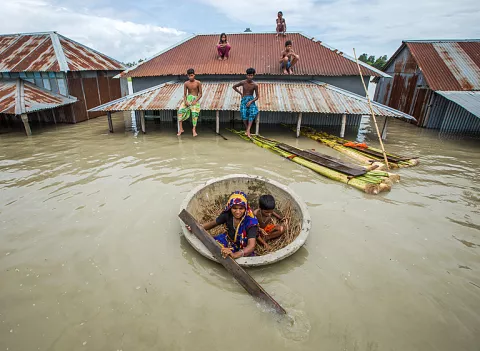
Small islands in the Pacific are already at serious risk of inundation today. Kiribati has even purchased land in Fiji to settle on once their island, home, and cultural sites are flooded. Inundation will not be limited to Small Island States, however. It threatens all low-lying areas, which are currently home to 11% of the world's population. Climate change, inconceivably intensified if climate tipping points are crossed, therefore threatens not only people’s lives and livelihoods, but also their homes, culture, and dignity.
Implications for foreign policy and Loss and Damage
As we can judge by now, passing tipping points will severely disrupt the lives of millions of people and lead to significant economic and non-economic Loss and Damage. As climate change and human security issues don’t respect state restrictions and borders, there will also be serious implications for national and international security and stability.
This is also evident in the current debate on international security. Security implications of climate change are repeatedly discussed in international fora such as the UN Security Council and the UN General Assembly, indicating that climate change and its impact on human security and Loss and Damage will become an increasingly important foreign policy issue. As tipping points become more likely to be crossed, they will also play a major role in determining the direction of future foreign policy, as will the induced increase in losses and damages.
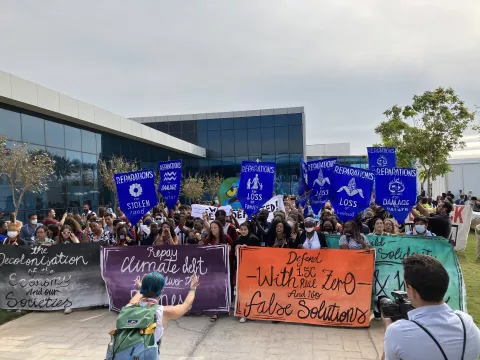
Unfortunately, the complexity of tipping points and the scientific uncertainty about when they will be crossed meet an institutional landscape that is poorly adapted to addressing climate security. As a result, tipping points and their implications are rarely, if ever, integrated into policy planning processes.
To fill this gap, we at Germanwatch propose a political early warning system for tipping points. This would provide stakeholders and policymakers with a systematic approach that translates the scientific evidence on tipping points and their impacts in concrete policy recommendations.
An early warning system for tipping points
An early warning system could provide an opportunity to avert major risks and prepare for the consequences of passing a tipping point well in advance. By forging links between science and policymaking, it could contribute significantly to safeguarding human security. The early warning system should provide concrete recommendations in the following areas of concern:
- Prevention of passing climate tipping points
- Preparation for the consequences of crossing them
- Assessment of the risks to human security
- Policy complementation and extension with regards to mitigation, adaptation, loss and damage, and climate, foreign, and security strategies
- Containment of the extent and speed of the consequences of exceeding the tipping points
Such an early warning system could be implemented through an annual report that complements the IPCC reports and offers specific recommendations for policymakers. Other than highlighting when systems are destabilising and moving towards their tipping point, the report should draw attention to regional and socioeconomic impacts.
To be effective, its recommendations should be addressed to climate, foreign, and security policymakers at different levels—regional (e.g. European Union Council on Foreign Affairs), national (e.g. foreign and environment ministries), and global (e.g. United Nations Security Council)—and tailored to their fields of action. This way, the early warning system would create synergies between climate science, peacebuilding, and security actors, implementing organisations, and policymakers. This, in turn, would reinforce the need for effective climate action, preventing conflict, averting, minimising and addressing Loss and Damage, and promoting peace and stability. Finally, the early warning system would make an important contribution to supporting and complementing existing calls for an update of the climate security architecture.
It's time to integrate tipping points into the foreign policy debate
As we have shown, tipping points and their transgression will severely affect the lives and livelihoods of millions of people. To respond timely and appropriately, policymakers must now include tipping points and the latest scientific insights in international and foreign policy discussions.
Other than implementing an early warning system, policymakers will need to stick to the Paris Agreement and consistently reduce greenhouse gas emissions. To avert tipping points that might tip even before 1.5° above pre-industrial mean temperatures, more investment in resilience building, adaptation, and Loss and Damage finance is also needed.
In the following blog posts, climate researcher Dr. Conor Purcell and political scientist Dr. Michael Keary will illustrate the consequences of passing climate tipping points and take a look at four of the most treacherous ones: the Amazon rainforest, the Atlantic Meridional Overturning Circulation and the Greenland Ice Sheet, Coral Reefs, and the West Antarctic Ice Sheet. They will also provide an overview of their physical nature and their impact on human security and Loss and Damage.

